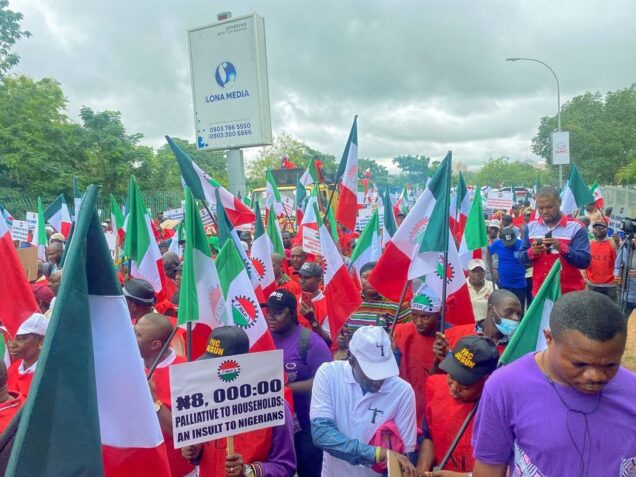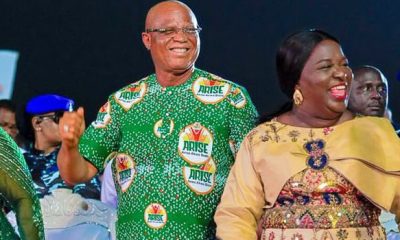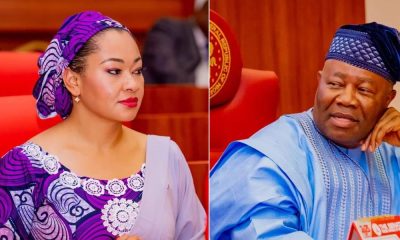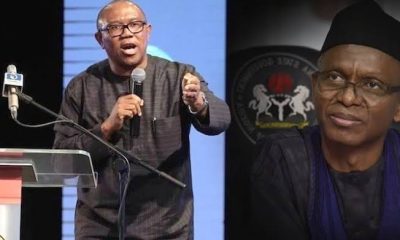Nigeria News
Organised Labour Laments Economic Hardship, To Renegotiate New Minimum Wage

Despite the implementation of the national minimum wage across the 36 states and the Federal Capital Territory (FCT), concerns have been raised by stakeholders and labour unions regarding the high cost of living in Nigeria.
Many workers are struggling to meet basic needs, with many unable to afford to feed their families.
As revealed by data analyzed by The Guardian, states have set an average minimum wage of ₦73,471.43, which is ₦3,471.43 higher than the federal government’s minimum wage of ₦70,000—representing a 5% increase. States like Akwa Ibom, Bayelsa, Delta, Enugu, Lagos, Niger, Oyo, and Rivers are paying higher than both the federal government’s wage peg and the national average.
However, less than a year after the new wage law was introduced, inflation has eroded much of its real value, leading to fresh agitation from stakeholders. Labour leaders are already setting their agendas for the 2027 renegotiation, citing that while the government made wage adjustments last year, these increases have been largely offset by inflation.
With inflation hovering around 24%, nominal incomes have lost more than one-fourth of their value. The average minimum wage across states, which is ₦55,000 in real terms, is far below the intended value when the wage was set.
Stakeholders point out that while the minimum wage has been implemented, the government at various levels has failed to make the necessary adjustments to keep up with inflation. Consequential adjustments to wages have yet to be agreed upon with all state governments, further exacerbating the financial strain on workers.
The rising costs of living, including telecommunications, transportation, food, electricity bills, school fees, house rents, and fuel, are pushing many workers to the brink. For instance, according to the National Bureau of Statistics (NBS), the average daily cost of a healthy diet for an adult in Nigeria is ₦1,255. A worker earning ₦70,000 a month would spend ₦37,650 on meals for the month, accounting for over 53% of their salary.
While many state governments are negotiating with their respective labour councils on the implementation of the minimum wage, Enugu state is yet to begin formal negotiations but has started a provisional payment of ₦80,000 minimum wage to its workers. The state’s negotiations are expected to proceed soon.
The update on the implementation of the national minimum wage also shows differing dates for the wage’s application across states. As of July 29, 2024, when President Bola Tinubu signed the 2024 national minimum wage bill into law, inflation stood at 33.4%. Although inflation slowed to 23.18% by February 2025, prices of basic food items and household goods remain high.
In states like Abia, Adamawa, Anambra, and Bauchi, the agreed ₦70,000 minimum wage has already been implemented. Akwa Ibom and Bayelsa, which negotiated ₦80,000, commenced payments in November 2024. Despite this, the National Minimum Wage Act does not apply to part-time workers, workers on commission, seasonal workers, and those in establishments with fewer than 25 employees.
While some labour leaders have praised the reduction of the negotiation cycle from five years to three, they have also expressed concerns about the current wage’s inadequacy due to inflation. Peters Adeyemi, General Secretary of the Non-Academic Staff Union (NASU), said that the previous five-year cycle was too long given the volatile economy.
He hopes that the reduced cycle will allow for wage adjustments that better reflect the current economic realities.
He argued: “I have always argued that the five-year period was too long in a volatile economy. Prices of goods and services go up almost daily, which renders the take-home pay of workers inadequate. Devaluation, price of PMS and inflation are the real enemies of the working class in Nigeria because these are what consume a large chunk of their salaries. With a year renegotiation period, hopefully, the figure that will be arrived at will be pocket-friendly.”
The President of the Nigeria Labour Congress (NLC), Joe Ajaero, also expressed dissatisfaction with the wage, stating that the increasing costs of living, particularly the deregulation of the downstream oil sector, have made the ₦70,000 minimum wage insufficient.
He accused the government of going back on its promise not to increase the pump price of petrol, which had been a key condition for agreeing to the ₦70,000.
However, he believes that agreeing to a three-year negotiation cycle, which will be due in 2027, presents the movement as unique to further push for a wage that will be closer to the reigning economic reality.
Emmanuel Onwubiko, National Coordinator of the Human Rights Writers Association of Nigeria (HURIWA), argued that no governor deserves commendation for implementing the minimum wage, claiming that ₦70,000 is far too low, especially with the devaluation of the naira. He emphasized that the real value of the wage has been eroded by inflation and the high cost of living.
He argued that a wage that is below $50 for 30 days is one of the lowest in the world.
Speaking to Guardian, he said: “The minimum wage is too low at ₦70,000. In these states, no one knows the number of workers they have. How can we then arrive at how much they are paying from what they get? We simply take whatever they tell us. The argument that the compliance level is high is not tenable to me.”
Onwubiko added that for a currency that has lost more than 100 per cent of its value in the last year, ₦70,000 is not enough to sustain a family of three for one month, saying: “The cost of living has skyrocketed by at least five folds in the last one year. What the former minimum wage of ₦30,000 could buy, ₦70,000 of today cannot buy it.”
He urged the tripartite bodies to gear up for another round of negotiations before the 2027 date.
Tolulope Alayande, an investment banker, acknowledged that while ₦70,000 is inadequate, it is a step in the right direction considering Nigeria’s economic constraints. He pointed out that the removal of the petrol subsidy was necessary, despite the economic burden it has placed on Nigerians.
As the country faces persistent inflation and high costs of living, labour unions and government officials are expected to continue discussions on how to adjust wages and improve the living conditions of Nigerian workers.



![[JUST IN] Full List: Reps Inaugurate 21-Member Ad-hoc Committee To Oversee Rivers Administration](https://www.naijanews.com/wp-content/uploads/2024/04/Abbas-Tajudeen-400x240.jpg)
![[JUST IN] Full List: Reps Inaugurate 21-Member Ad-hoc Committee To Oversee Rivers Administration](https://www.naijanews.com/wp-content/uploads/2024/04/Abbas-Tajudeen-80x80.jpg)







